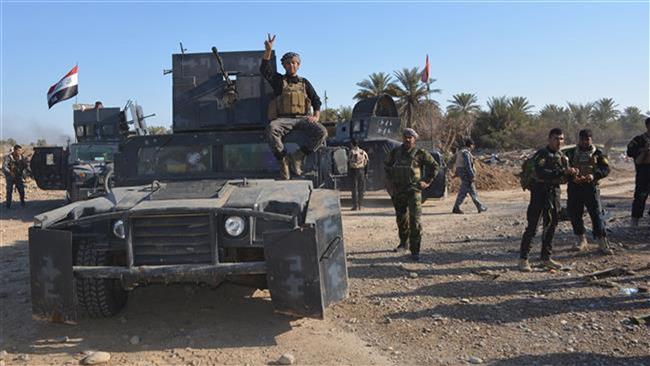 Iraqi forces re-group during a military operation in Diyala Province on Jan 24, 2015. �AFP[/caption]
Iraqi forces re-group during a military operation in Diyala Province on Jan 24, 2015. �AFP[/caption]Iraqi forces heavily fortified by Iran-backed Shiite militia fighters have launched an assault to recapture Tikrit from�Islamic State�jihadists. The Iraqis report progress, with Islamic State fighters retreating. That's significant because this is the largest offensive since Islamic State marauded across Iraq and Syria last year, planting its flag on a huge swath of territory and proclaiming a new Islamic caliphate.
Iraq's wobbly army couldn't oust Islamic State without help. So Tehran is supplying Baghdad with a cadre of high-level military advisers and an array of military hardware to retake Tikrit. Yes, Tehran is largely running the show. Not Washington.
Why not? The Iraqis didn't ask Washington for help.
Need more proof that the struggle to crush the Islamic State has scrambled alliances across the Middle East?
The U.S. and Iran square off in nuclear negotiations that come down to the wire this month. Meanwhile, in Iraq, the U.S. and Iran are fighting ... on the same side, to pulverize Islamic State jihadists.
"The enemy of your enemy is your enemy," Israeli Prime Minister Benjamin Netanyahu warned�Congress, earning thunderous applause. True. But in this case, the enemy of our enemy still can be useful in the fight against�another�enemy.
The U.S. hopes to rebuild the Iraqi army so that it represents Shiites, Sunnis and Kurds. U.S. forces are training Iraqi troops for the upcoming battle to recapture Mosul, the largest city under Islamic State control.
Iraqi fighters of the government-controlled Popular Mobilisation units take part in a military operation to take control of Tikrit from Islamic State on March 11.
A volunteer Shiite Muslim fighter, a member of what is known as the Popular Mobilization Units, gathers with others in the city of Samarra on March 5 ahead of moving out toward Tikrit.
"The only way in which the�Obama�administration can credibly stick with its strategy is by implicitly assuming that the Iranians will carry most of the fight and win the battles on the ground," Vali Nasr, a former special adviser to President Barack Obama, told The New York Times. "You can't have your cake and eat it too � the U.S. strategy in Iraq has been successful so far largely because of Iran."
That's why Gen.�Martin Dempsey, chairman of the U.S.�Joint Chiefs of Staff, told reporters: "The important thing about this operation in Tikrit in my view is less about how the military aspect of it goes and more about what follows."
That is, will the U.S. persuade Iraq Prime Minister Haider al-Abadi to share power with Sunni and Kurdish leaders? Or will al-Abadi listen to Iran's mullahs, who seek a friendly Shiite-led client state to extend their regional influence and threaten enemies?
"The most difficult thing the U.S. is doing in Iraq is not the military operation, it is fostering the political reconciliation between Sunni, Shiite and Kurds," Seth Jones, director of RAND's International Security and Defense Policy Center, told us.
Iraq was a ripe target for Islamic State leaders because former Prime Minister�Nouri al-Maliki�failed to follow through on promises to include Sunni Muslim leaders in key positions in his government and armed forces. Instead, the Shiite leader purged Sunnis from the armed forces and government. He set the stage for a furious backlash and Islamic State's ascension.
All that talk of the invincibility of Islamic State fighters? "There was less than meets the eye to the dazzling blitzkrieg that brought (Islamic State) to the world's attention last year," Time magazine recently reported. "(Islamic State) troops raced through northwestern Iraq to the outskirts of Baghdad not because they were an unstoppable military force but because no one wanted to stop them. In city after city, they met seething residents eager for a champion. It was a cakewalk."
First order of business: Bury Islamic State. The U.S. � the entire Middle East � benefits if that happens.
But then what? Iran, a major sponsor of terror, is deepening its control of the Iraqi army. The leader of Iran's elite Quds Force � a terrorist responsible for deadly attacks on U.S. forces during the Iraq War � was reportedly spotted sipping tea in Tikrit. That should set off alarms in Washington.
The U.S. and its Arab allies can push back. Remind Iraqi Prime Minister al-Abadi that any victory over the Islamic State will be short-lived if Sunnis, Kurds and Shiites in Iraq can't find a way to share power. Even if Islamic State falls, another Sunni-led force will rise to rip apart Iraq.
By Chicago Tribune










